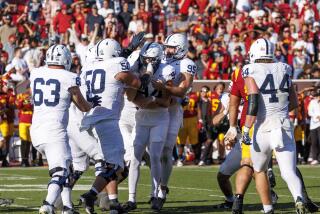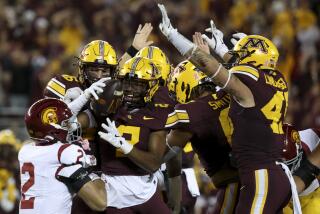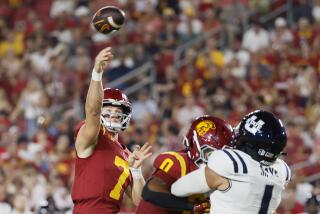USC’s Master Plan Needs a Major Overhaul Soon
- Share via
With seven seconds left and USC having overcome bad shots, bad fouls and bad fans to chop a 16-point Stanford lead to two, Brandon Granville starts dribbling the ball.
Stanford star Casey Jacobsen has just missed the front end of a one-and-one but USC has no timeouts. Hasn’t had any for nearly nine minutes but Coach Henry Bibby says it didn’t matter. He wouldn’t have called one.
Granville dribbles and dribbles and dribbles. He dribbles until there is only a second left and then comes sliding near the free-throw line where he stumbles and heaves an off-balance airball.
No. 1 Stanford 70, USC 68.
Who knows what Granville was planning. Was he planning anything?
The season is disappearing quickly for the Trojans. Unless you’re excited by the NIT. Maybe if USC defeats Cal on Saturday at the Sports Arena and sweeps the Washington schools next weekend they will get that bid. But it’s no guarantee the Trojans will defeat Cal. Or that the sweep will get them that bid.
Bibby comes to talk after this disheartening loss to the country’s top-ranked team and starts by making a statement. Bibby’s statement is that he is not leaving USC. If we write that he is leaving USC, Bibby says he won’t read newspapers anymore. Nobody lately has written much about Bibby leaving USC. His name has been mentioned for the Nevada Las Vegas job but Nevada Las Vegas keeps interviewing Rick Pitino. So we won’t mention Bibby leaving USC.
We will mention that Bibby has not seen his USC team improve much this year.
Stanford comes to the Sports Arena with a haughty confidence along with its No. 1 ranking.
It is the kind of confidence that allows Jacobsen, a sophomore guard, to express his distaste for fouls called against him with aggressive facial expressions and loud words and not earn a technical foul while in the same game someone in the USC crowd--someone unruly and undisciplined and rather ignorant--earns their team a technical by throwing garbage onto the floor.
But this game isn’t about technical fouls, even though Bibby said he would like to blame the crowd for the loss and put some pressure there.
Note to Bibby: The crowd isn’t getting paid to coach and win. The crowd didn’t cost the Trojans this game.
The crowd is not responsible for this season of disappointment. This USC team, which plays so hard, with such bountiful energy, also plays too often without basketball smarts.
Brian Scalabrine, Sam Clancy, Jeff Trepagnier, Granville. They all throw their bodies to the floor, jump high, take an elbow and even give one. They do all this without much sense of the game and much purpose.
You watch Stanford. Every pass comes with a plan. The plan is to advance the ball into the basket. You watch USC and every pass just comes.
One time Scalabrine caught an entry pass but the ball came a moment too late. So Scalabrine throws a pass back to guard Robert Hutchinson. Hutchinson seems surprised even though Hutchinson is wide open and has several seconds to shoot a three-pointer. But Hutchinson doesn’t shoot. He moves closer to the basket. Now he has an open 18-footer. But Hutchinson doesn’t shoot. He passes the ball back to Scalabrine. Scalabrine seems surprised and holds the ball for a moment, then turns to shoot. But it is too late. USC is called for a three-second violation.
Turnover.
Here is a team of veterans, of hard-working kids and they have not improved this season.
The best moments of USC basketball come because of singular individualism.
A Trepagnier stair-climbing, sky-walking rebound brings the crowd to its feet. A Desmon Farmer twisting, twirling, leaning, off-balance layup makes the crowd take notice. It also makes the score, 60-52, still in favor of Stanford.
The Trojans don’t quit. But they don’t improve. They don’t ever get the big win, the one over Stanford or Arizona or UCLA. It is not that the Trojans are without enough talent to do it. It is not that the Trojans don’t want to do it.
It is that the Trojans don’t know how to do it.
With 3:47 left, USC has cut Stanford’s lead to 65-60.
Stanford throws the ball away but Scalabrine, trying to do the offensive work by himself, backs in too hard and is called for charging. Was that the play? Let Scalabrine work alone? Scalabrine, without great speed or jumping ability or one-on-one moves, seems an unlikely choice for going it alone. But that’s what he does.
With 1:30 left and with Jacobsen having just scored to make Stanford’s lead 67-62, there is a Cardinal timeout. During the break, Trepagnier stands at the outside of the USC huddle. He is talking to a teammate. There must be some joking going on because Trepagnier is laughing. He certainly is not listening to anything Bibby is saying. Trepagnier hasn’t played much in the second half either. What’s going on?
Clancy scores anyway--67-64 Stanford. But the Trojans let Stanford use most of the shot clock before they foul Jacobsen with 31.4 seconds left. Why wait so long? Why foul Jacobsen? Jacobsen makes one free throw but it takes 17 seconds for Scalabrine to score a two-point basket.
“Everybody has written us off,” Bibby says afterward. But they haven’t. Everybody said USC would be looking NCAA-good if it beat Stanford.
“We played hard,” Bibby says. Yes, his Trojans did. They always do. Bibby gets his team to play hard. Always.
But for what purpose? What is this team about? Where does it go at the end of these close games, these winnable games, the name-making games? It always seems to go the wrong way.
*
Diane Pucin can be reached at her e-mail address: [email protected].
More to Read
Go beyond the scoreboard
Get the latest on L.A.'s teams in the daily Sports Report newsletter.
You may occasionally receive promotional content from the Los Angeles Times.






